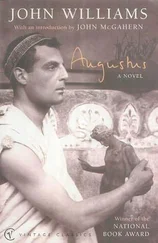The two men sit. Little wind blows. John's face is tilted, his eyelids closed, his grey-white eyebrows lowered. He says nothing. He is a man for whom time itself seems inconsequent. It is as though, some time past, the turning of one hour into the next became to him of no matter and the numbering of one day to another a thing no longer counted. In his darkness, time is without measure of light. When he speaks of the hour that is at hand, it may be yet an age hence. He will wait. So it is, he sits and says nothing in reply for a long time. The two old men look not unlike statues high on the smooth rock. But the Apostle is troubled. He has known Ioseph more than two score years and never felt in him the despair he hears now. What is he to say? Is he to confess his own fears? To tell his old friend that he prayed for Prochorus to be spared? That he mounted high stacks of petition on the shelf of his mind, and yielded to the death only with a weak acceptance of the mystery of the Lord's way? There would be no consolation in this. He cannot tell his own thoughts. Instead, he holds silence, searches in himself for a voice.
Then, loudly the Apostle says: ' "My sheep hear my voice and I know them and they follow me. And I give unto them eternal life, and they shall never perish, neither shall any man pluck them out of my hand." I heard our Lord Jesus say this with my own ears, Ioseph, in Jerusalem, in the winter, in the time of the feast of the dedication. "And I give unto them eternal life." ' He reaches and finds the other's hands, holds them in his own. 'Old friend, do not despair. Grieve not for Prochorus. He was a loyal servant of our Lord and this day is in the kingdom of heaven. Neither grieve for yourself, Ioseph. For each of us the Lord has his plan. Ours is only to recognise this truth and attend him as servants a master. We wait.'
There are curious seabirds overhead. They watch for fragments of bread, foodstuffs, fish, and cry raucous as though in torment. The sea tumbles. Sky burdened with cloud releases no light. The island seems evermore a prison.
Then John speaks from a psalm. He speaks softly, as if testing that the words like stepping-stones will take him across water.
'When the Lord turned again the captivity of Zion,
We were like them that dream.
Then was our mouth filled with laughter
And our tongue with singing.'
He has found the psalm without looking. The words of it are inside him. It may be that in the lifetime of his preaching he is become a living book. The scriptures entire are scratched on his spirit, written with reed pen, dipped and dug into the soft red pulsing of his inner being. Inside him is a scribed record of testament. The voices of Moses, of Joshua, Ruth, Samuel, the Books of Ezra, Nehemiah, Esther, and Job, the Psalms and Proverbs, all of these are within him, and so, too, all from the twelve chapters of Ecclesiastes to the Book of Isaiah, from the voice of Daniel to Malachi. He is living book and carries their voices and their telling like a wind ever whispering inside him.
'Turn again our captivity, O Lord
As the streams in the south.
They who sow in tears shall reap in joy.
He who goes forth and weeps bearing precious seed
Shall doubtless come again with rejoicing
Bringing his sheaves with him.'
His voice grows stronger as he recites. Ioseph looks at him and is moved. 'We have missed your preaching,' he says simply.
The seabirds circle, as though chained.
'We would benefit greatly, all of us, if you preached to us again.' Ioseph leans forwards, speaks to the blind face in near whisper. 'I fear among us are heresies.'
A gap of sea sigh and gull cry. Light darkens under cloud.
John says, 'I know there are.'
Across the stony ground of the cliff top and through the scrub of thorn bush and weed where tethered is a thin goat, Papias hurries. He comes down the slope to the place where he buried the children and is relieved to find the rocks unmoved. He prays a short prayer, then continues to the dwelling. He is not sure why he has come. He is afraid of his reasons and leaves them in a corner of his mind. He knocks on the wooden frame. There is no reply. He calls out, but nothing happens. He looks around, behind him, at the desolate waste ground, three crooked sticks where cloths had been hung, a hank of briny rope, a holed bucket. He calls again, then enters.
At first there are only shadows. Papias can make out nothing. There is a stench of rotting, a salt tang of seaweed stewed long ago. He hands the edge of the rough wooden table, holds there briefly, blinks, says, 'It is I, Papias.'
His breath is loud and short. Fear of many kinds is within him. He thinks of the raw red print on Prochorus's face, the rage of the fever, the skin that buckled and bubbled and curled back from the bone blackly as though peeled. Silently he tries to say 'The Lord is my Saviour' over and over even as he breathes the thick grey soup of the air and fears he takes within him the disease. The Lord is my Saviour. He will protect me. I am a fool. I am weak to fear anything. The Lord is my Saviour. He will not let me die. Across the earthen floor a rat scuttles toward him, is apprised by smell or sense, and suddenly turns, darts into the dark. Papias looks down and in the dimness makes out the legs of the woman Marina.
She is not dead. Her mouth lets a slight warm bloom against his cheek as he cradles her head. Her eyes are far away.
'It is I, Papias,' he says. She does not move. He has not held a woman so, and the living weight of her is shocking to him — not the burden in his arms, for she is light, but the living substance of her. Her hair falls on his forearm. Her face is tilted back, and he touches it to bring her eyes towards him, but they are unseeing. Is that a blemish of contagion on her cheek?
The Lord is my Saviour.
Kneeling, Papias brings her head upright on the support of his arm. She is weak, she is collapsed from exhaustion and grieving, he decides. But within him he cannot escape the memory of her telling that she was with demons. He presses the thought away, shoving it deep. But it merely coils and snakes back and slithers now across his chest.
In an instant he sees it rise, actual, large, and loathsome into the dim air of the small room. It flicks back its head, makes hiss, and stretches with deep luxuriance, released from the tight confines of denial. The demon snake is a hundred times a snake. It twists about, rises to the rough mud of the roof, towers above the man and woman, and lets jab at nothing its forked tongue. Papias stares at it and holds Marina, as though aboard a rudderless boat that enters the mouth of a storm.
The Lord is my Saviour.
The demon laughs. Its coils continue to rise, coming from beneath, curling. Its green-gold-patterned snakeskin sliding past Papias and crowding the room. Now it lies along the lower wall, now a second length upon itself, and a third. The demon is unending; it fills the space like sin and thickens the air with a sweet poison. Papias raises his hand and cries out in fear.
The demon laughs. 'How thin is your faith,' it says. 'Look at you!'
Sharply it flicks forward its great head, lets fly its tongue so the thin yellow fork of it lashes like lightning, snaps, quivers not a finger's breadth from Papias's face. He screams, closes his eyes, thrashes at it wildly with one hand, touching nothing. With his other arm he clings to Marina.
The demon retires a small distance. 'You cannot drive me off,' it says, and laughs again as from behind Papias its tail comes and crosses his belly and enwraps him and the woman both. Papias heaves at it, but it is too great a weight.
'Go!' he cries out. 'Go. Be gone!'
But the demon does not. 'Dear friend Papias, where would I go?' it asks.
'My name. How do you know my. .?'
Читать дальше










